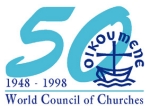

No. 10

|
WCC Anniversary and Eighth Assembly |

|
|
Feature Service No. 10 | ||
 en français
en français  auf Deutsch
auf Deutsch  en español
en español
In many places young people are missing when the WCC or ecumenism is on the agenda. Is ecumenism only an issue for older, erudite theologians in the churches? Or is ecumenism something that should concern the whole people of God?
Since 1948 more than 1500 young people between the ages of 18 and 30 have been involved in the WCC’s Stewards’ Programme. This programme invites young people from different churches all over the world to major WCC meetings to carry out practical tasks associated with the running of the meeting, and to observe the work of ecumenism. Visser ’t Hooft wanted young people to encounter ecumenism and its leaders so one day they would in turn become ecumenical leaders, just as he had done.
"Where are the young people?" That is a relevant question to ask this year as the World Council of Churches (WCC) celebrates its 50th anniversary.
Many leading ecumenical personalities of this century began their involvement in ecumenism at an early age. Before becoming the WCC’s first general secretary in 1948, W.A. Visser ’t Hooft was involved in the work of the YMCA and the WSCF. At the World Missionary Conference in Edinburgh in 1910, William Temple was 28 years old when, as a steward, he showed people to their seats. Later he became Archbishop of Canterbury and was the chairman of the Faith and Order conference in Edinburgh in 1937 where plans for a world council of churches were laid. Many other names from the past could also be cited and we will also find among the present leadership of the WCC many who began their ecumenical pilgrimage as young people.

There will be 175 stewards from 75 different countries at the WCC Eighth Assembly later this year in Harare, Zimbabwe (3-14 December). It is hoped these stewards will become ecumenical catalysts in their own churches, and thereby carry ecumenism to a new generation. So, stewards at the Assembly will not only represent themselves but also the community from which they come. However, ultimately it is the strength and support of local churches and ecumenical youth networks which determine how the seeds planted in the stewards programme will take root in the stewards’ own soil.
Young people have claimed full participation within the life and work of the WCC since its beginning. Each generation of young people has shared the vision of this full participation; they have also shared the disillusionment when the leadership in the churches has hindered it. However, there have been positive developments within the WCC during recent years.
At the first Assembly in Amsterdam 100 youth delegates participated but were seated up in the gallery without the right to vote. At the fourth assembly in Uppsala in 1968, 4% of the voting delegates were youth. At the next assembly in 1975 at Nairobi the figure was 9%. In Vancouver in 1983 it was 13.5% and 11% in Canberra at the seventh assembly in 1991.
For the Harare Assembly the figure will be 15% and that means around 150 delegates who will be young people aged between 18 and 30 years. The churches increasingly realise the importance of involving young people within the ecumenical movement. This commitment for inclusion also found expression during the Canberra Assembly when Ms Priyanka Mendis from Sri Lanka was elected as a WCC President and became the first young person to hold this prestigious position which is far from being simply an honorary one.
Through the priority given to the participation of young people in its life and work, the WCC also demonstrates its belief that it is necessary to involve young adults in church and society matters if renewal and change is going to take place.
Young people in the church want to show the world the relevance of their Christian faith today. They do this by witnessing about the Risen Christ who came to bring hope and life. By responding to injustice and standing in solidarity with oppressed youth around the world, Christian young people are giving a credible testimony to the world.
In August of this year, as governments from a number of countries began to involve their peoples in the escalating conflict in the Democratic Republic of Congo, ecumenical young people from the whole of Africa were finalising their preparations for a continental youth peace project.
In Asia, ecumenical youth in Indonesia are among those who are responding to the difficult situation within their country by actively working for changes and calling young people all over the world to support them.
More than 400 young people from a wide variety of churches and more than 100 different countries will attend the WCC Assembly in Harare. In the days prior to the Assembly many of them will meet at a pre-Assembly Youth Event, 28 November - 1 December. With this number of young people coming together, the pre-Assembly event will itself be one of the major ecumenical youth events to have been held during the last 10 years. Young delegates, stewards and advisors will prepare themselves for the Assembly. The worship services and the community they will experience just before the Assembly begins will provide a space in which they will be able to make their personal response to God’s gift of, and call to promote Christian unity.
Youth delegates will also be part of the leadership at the Eighth Assembly. This will be most apparent during the second phase of the Hearings when six young people will act as moderators in the six sets of hearings. While the first phase of the Hearings will evaluate the work of the WCC since the last assembly in Canberra in 1991, the second phase will look to the future and agree on policy guidelines and priorities for the work of the WCC as it moves into the 21st century.
The WCC has a vision of young people as the key to the future and the present of the churches, the WCC and the ecumenical movement itself. When, in Harare, it gives youth prominent leadership responsibility that vision will become a reality.
Rev. Freddy Knutsen is WCC executive secretary for youth affairs. He is an ordained minister of the Church of Norway. He is available for further comment and interview. Radio journalists please note that for interview purposes we have an ISDN line installed in our radio studio using a CCS Codec M66I 64K.
Use of the article must credit Freddy Knutsen as author. Editors are free to shorten the article if they wish but this should be acknowledged. Please send a copy of anything you publish for our records. Thank you.
The photographs to accompany this article are available upon request. Use of the photographs is free when used with the article. Other use will attract the usual WCC fees.
Good quality reproductions of the photos are available via Internet or ordinary mail. To order a photo via Internet, just click on it. When you have located your photo, complete the online order form. Photo Oikoumene will send the photo electronically as an attached file, at 300dpi resolution, JPEG format.
If you want a colour slide, or colour or b/w photo by ordinary mail, send an E-mail inquiry to photo
Please also feel free to download the Assembly and 50th Anniversary logos directly from this page, or contact us if you wish us to airmail them to you.
John Newbury
Press & Information Officer
P.O. Box 2100
1211 Geneva 2, Switzerland
Tel.: (+41 22) 791 6152/51
Fax: (+41 22) 798 1346
E-mail: media
 Feature Service list
Feature Service list
 8th Assembly & 50th Anniversary homepage
8th Assembly & 50th Anniversary homepage
 Press Release list
Press Release list
 WCC homepage
WCC homepage